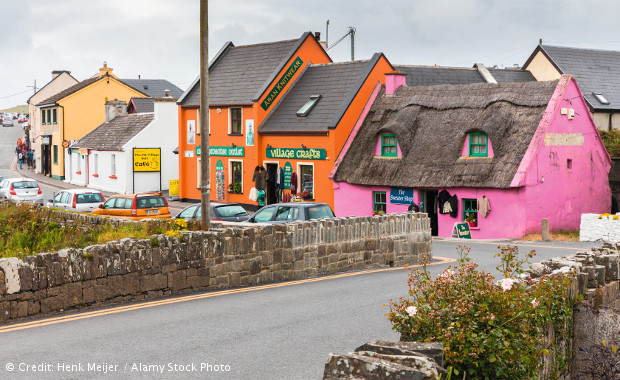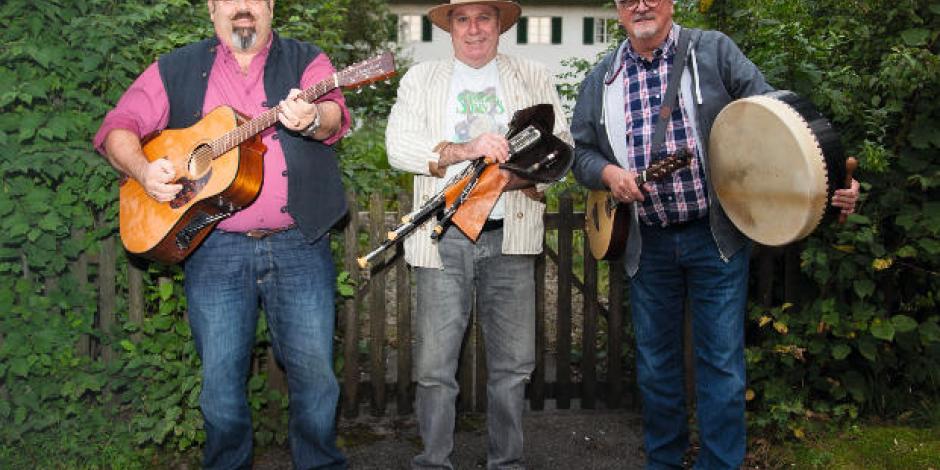“Kevin,” I say down the office telephone line. “Do you want to go hear some Irish music tonight?”
Kevin, who’s Irish and relatively new to Germany, doesn’t hesitate. “Where?” he asks, surprised. “And when?”
The question I thought he’d ask is, “Who’s playing?”. It’s Keltentanz, a band that holds a first-Thursday-of-the-month session at a pub near Murnau. The pub is in Habach, a village of 1,000 souls that had its great moment in history in the 10th century, when it was connected to Ulrich of Augsburg, a bishop and later a saint. Today, Habach to be the envybeneidet werdenis the envy of other villages for having a well-stockedgut bestücktwell-stocked Dorfladen, or village shop. Another claimAnspruchclaim to fame is its friendly music bistro, Zum Trödler.
“Tonight at eight,” I tell him. “At the Trödler.”
“The what?” Kevin asks. I explain that the pub’s name means “junk dealer”, a person who sells second-hand things.
“The Trödler — you know. We’ve been there for pizza and beer. to turn outsich herausstellenTurns out they have Guinness, too.”
That really to seal the dealbesiegelnsealed the deal. But what I did not tell my brother-in-law was that I needed him to come along to to vet sb.jmdn. auf Herz und Nieren überprüfenvet the band. Keltentanz is made up of three, sometimes four men who play Irish traditional music. I’d heard them once before, and I liked their sound. But was it authentic?
Guinness in Habach
Seated on an antique sofa in the Trödler’s cosygemütlichcosy bar, Kevin and I wait for the show to begin. The band is to set upaufbauensetting up at a long table. Among their instruments are a banjo, a mandolin and six- and 12-string guitars, but some of their gearAusrüstunggear looks strange to me: the uillean pipes — the national bagpipeDudelsackbagpipe of Ireland, Kevin says — and a hand-held drum called the bodhrán. Kevin chats with the musicians and discovers what I’d hoped to to keep mumfür sich behaltenkeep mum a bit longer: that the boys in the band — Max Buchner, Andreas Glaesemer, Herbert Klein and Franz Wörle — are not from the Emerald Isledie Grüne Insel (Irland)Emerald Isle.
The sound transported me, if only momentarily, back to the Emerald Isle
never mindEgal! Macht nichts!Never mind. the proof is in the puddingprobieren geht über studierenThe proof is in the pudding. Within minutes, the pub is full. I hear German voices, Australians, Brits — an American, too: a woman who’s here on holiday from New Mexico. Then the music begins. First, there’s an instrumental with plenty of pipes. Then comes “Back Home in Derry”. The lyricsSongtext(e)lyrics to floatschwebenfloat clear and true across the bar, telling the story of when, in the early 19th century, the British put pressure on the Irish to emigrate to Australia. Next comes a lively, hopping (N. Am., ifml.)lebhafthopping tuneMelodie, Liedtune that Kevin says is a three-part jig. He’s to beamstrahlenbeaming.
“They’ve cracked it,” he says, nodding. “They’ve got all the subtletyFeinheitsubtleties down.”
More Guinness arrives at the table. Someone says it’s being served in the right glass. “And it’s the right drink, too,” Kevin adds with a smile. Later on, he tells me how the jigs, reelhier: irische Tanzmelodiereels and ballads reminded him of home, and that “listening to them play, no one would’ve guessed” that the members of Keltentanz were from Germany.
“That musician must have performed his 10,000 hours of practice to arrive at the mastery of those instruments,” he says of the man on uillean pipes and tin whistle. “That sound transported me, if only momentarily, back to the Emerald Isle.”
Das Spotlight Sprachmagazin
Die Welt spricht Englisch: Sprechen Sie mit! Mit dem Spotlight Magazin verbessern Sie Ihren englischen Wortschatz kontinuierlich und erfahren zudem Wissenswertes aus der englischsprachigen Welt. Jetzt mehr erfahren!
Weissbier in Weilheim
The piper in question is Max Buchner, 60, retireeRentner(in)retiree and lifelong lover of the Irish folk sound. I meet him at his home in Weilheim, the county seathier: Kreisstadtcounty seat. We sit on his porchVerandaporch and shoot the breeze (ifml.)gemütlich plaudernshoot the breeze. He offers me a beer, but I’m working, so I to declineablehnendecline. It would have been nice, though, sipping a Weissbier while listening to the church bells and the sounds of the neighbours’ children at play.
Buchner says his love affair with folk music started when he was 15 or 16. He and his friend Franz Wörle — on the accordion in Keltentanz — used to go down to the bankUferbanks of the River Ammer and play Bob Dylan songs. Back then, in the early 70s, the Celtic music revival in Ireland was to spill oversich ausweitenspilling over in to Germany. Big acts like Eddie & Finbar Furey could even be seen on Bavarian TV.
“Ah, we were totally fascinated by them,” says Buchner. “So we decided to do something really different for our holidays: instead of going south, like we always did, we said, ‘Let’s go to Ireland’.”
Buchner travelled up the west coast of Ireland, past the Cliffs of Moher, to a little village in County Clare on the Atlantic Ocean called Doolin.
“There was a brilliant Irish folk pub there,” he says. “The people who were later the big Irish superstars, you’d see them just sitting at the table in there, like you and me are sitting here now — musicians like Finbar Furey.” Back then, he says, you could go to Dublin and see the famous groups like The Dubliners, too, at pubs such as Slattery’s and The Stag’s Head.

“The people there in Doolin were very friendly. There’s the famous book, Irisches Tagebuch by Heinrich Böll — we certainly experienced a bit of that atmosphere,” he says. By way of example, he adds: “This old guy comes up to me and says, ‘I was also Hitler’s guest’ — as in, ‘I was also a prisoner of war’.” Buchner explains that his own father was in the Second World War, too, so he had some of those stories to share with the locals.
After that trip, Buchner to be hooked on sth.nach etw. süchtig seinwas hooked on Irish traditional music. “We had no choice other than to work with the vinyl recordSchallplattevinyl records we’d bought over there,” he says. “And to make sure we didn’t do them damage by overplaying them, we recorded them on to cassettes.
“That way, we could listen to the music as long and as often as we wanted — and practise trying to play the music. We would play the cassette, then to rewindzurückspulenrewind; play the cassette, rewind. We did it until we to get sth. down patetw. perfekt beherrschengot it down pat.”
We made a bit of a name for ourselves, and in Upper Bavaria, we were the Irish folk band
Meanwhile, real life intervened. Buchner’s parents convinced him to join the family business, a shoe shop in Weilheim in operation for more than 100 years. He had time to to pursueverfolgen, nachgehenpursue his first love on the side, playing at the big Irish music festivals in the area sponsored by Guinness — in Murnau and Habach, for example.
“It went well, the music we played was very well received. We made a bit of a name for ourselves, and in Upper Bavaria, we were the Irish folk band. … But, you know, the professional Irish artists were the ones putting out records and building careers. As a German, you can kind of forget it.”
Vinyl in the afternoon
That said, Buchner has made LPs. He lays them out on the table. One was produced with the first iterationVersioniteration of the Keltentanz band back in 1980; another was with his next band, Róisín Dubh (Irish for “Black Rose”), in 1987. The Irish Pub in Munich’s Schwabing district was one place Buchner went to play — with a band called The Greensleeves. But that connection no longer existed by the late 80s. Róisín Dubh continued, though, before breaking up in 1995. That’s when Buchner took a year off from music.
“Yeah, with the groups for a little while we were able to make good money, too,” he says. “We really were the best Irish folk band in Bavaria. It was good fun and a good business.”

Pubs sind für viele Briten und Iren second homes. Mehr über die Pubkultur auf den britischen Inseln (und – per Import auch in Deutschland) erfahren Sie im Babbel Magazin, unserem Kooperationspartner für dieses Thema.
Buchner says he soon found his way back to the music: “An old friend of mine came by and said, ‘Hey, you know, let’s do a pub session once a month’ — and that’s kind of how it got going again in Habach.”
The new group chose the name “Keltentanz” so members could feel free to play the whole to spanSpannweitespan of Celtic folk music, from Breton songs, to German folk tunes, Irish music and more. The band want to give listeners a well-balanced mix of instrumentals and ballads, depending on which members are available to play.
Buchner explains that he and his friend Franz tend to think of themselves mainly as instrumentalists, while Herbert, who’s from Cologne, and Andreas from Bad Heilbrunn, play musical instruments as well as adding strong, distinctive singing voices to the mix.
“I hold back a bit on what I like so that the others can contribute more of what they like, too,” Buchner says with a grin. “After all, we all have to have our fun.”
Experience Keltentanz
First Thursday of the month at:
Zum Trödler Bistro
Hauptstrasse 13
82392 Habach
www.troedler-habach.de
Next St Patrick’s Day, 17 March 2018:
Alt Mittenwald Bistro Bar
Hochstrasse 18
82481 Mittenwald
www.alt-mittenwald.de



